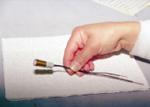 Reuters: The U.N. nuclear watchdog has received an explanation from Iran about the development of detonators that can help set off an atomic explosive device, and has asked for further clarification, diplomatic sources said on Friday.
Reuters: The U.N. nuclear watchdog has received an explanation from Iran about the development of detonators that can help set off an atomic explosive device, and has asked for further clarification, diplomatic sources said on Friday.
By Fredrik Dahl
VIENNA Fri May 9, 2014 12:23pm EDT

(Reuters) – The U.N. nuclear watchdog has received an explanation from Iran about the development of detonators that can help set off an atomic explosive device, and has asked for further clarification, diplomatic sources said on Friday.
How Iran responds to the U.N. agency’s questions about so-called Exploding Bridge Wire (EBW) detonators is seen as an important test of its willingness to cooperate fully with a long-stalled probe into suspected atomic bomb research.
Iran says allegations of such activity are baseless, but has offered to help clear up the issues with the International Atomic Energy Agency (IAEA), a Vienna-based U.N. body.
The United States says Iran’s readiness to tackle the IAEA’s concerns will be central to the success of efforts to reach a broader diplomatic accord to end the decade-old nuclear dispute, which Tehran and major global powers aim to sign by late July.
Iran provided information to the IAEA about the fast-functioning detonators, which it says are for civilian use, in late April, the sources said.
They said the IAEA had asked Iran follow-up questions, but they did not give details of these and there was no immediate comment from the IAEA or Iran.
“Answering questions about EBW is significant – assuming the answers are substantive and sincere – because it gets to the heart of one of the sticky issues involving allegations of past nuclear work of a possible military dimension,” said Mark Fitzpatrick, director of the non-proliferation program at the International Institute for Strategic Studies (IISS) think-tank.
Iran wants an end to sanctions that are hurting its oil-dependent economy. After years of an increasingly hostile standoff with the West, last year’s election of the pragmatist Hassan Rouhani as Iranian president paved the way for a thaw.
STEP BY STEP
Iran and the IAEA agreed in November on a step-by-step process to address allegations that Tehran may be seeking to develop a nuclear weapons capability. The Islamic Republic says its nuclear program is a peaceful energy project.
As one of seven measures to be implemented by May 15, Iran agreed to provide information on the EBW detonators.
The mere fact that Iran agreed to address the issue was seen as a breakthrough as the IAEA has tried for years, mostly in vain, to investigate allegations that Iran may have worked on designing a nuclear warhead.
It was, however, one of the least difficult issues that were detailed in a landmark IAEA report in late 2011 that provided a trove of intelligence information pointing to past activities in Iran relevant to nuclear weapon development.
Western diplomats and experts caution that Iran must still do more to address concerns about what the IAEA calls the possible military dimensions (PMD) of its nuclear program.
Iran and the IAEA have yet to agree on new measures to be implemented after May 15, the diplomatic source said.
Iran’s discussions with the IAEA are separate from its negotiations with six world powers on a long-term settlement of the nuclear dispute, but both sets of talks are aimed at ensuring that it does not develop nuclear weapons.
“How Iran deals with its work on explosive bridge wire detonators … may provide clues as to how forthcoming Tehran will be on PMD issues,” Robert Einhorn, a former top U.S. State Department official on Iran, said in a report.
Iran’s interim agreement in November with the United States, France, Germany, Britain, China and Russia focused mainly on preventing it obtaining nuclear material to build any future bomb, rather than on the question of whether it had sought atomic bomb technology in the past.
(Editing by Kevin Liffey)


